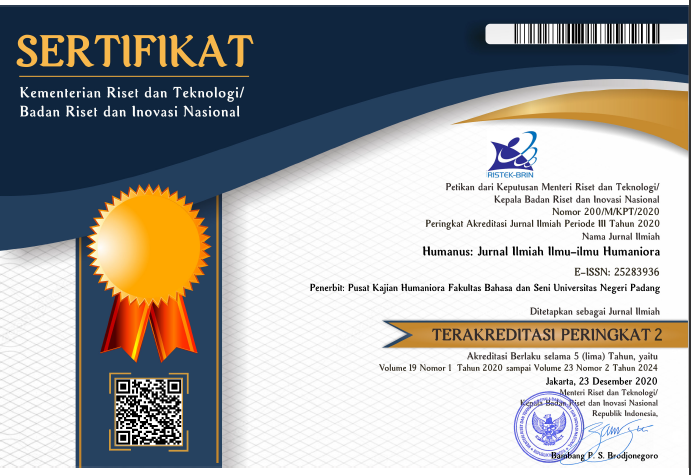Art and Entertainment as Representation of Urban Community Lifestyle in Indonesian Metropop Novels
 ), Hasanuddin WS(2), Syahrul Ramadhan(3),
), Hasanuddin WS(2), Syahrul Ramadhan(3), (1) Universitas Negeri Padang
(2) Universitas Negeri Padang
(3) Universitas Negeri Padang
 Corresponding Author
Corresponding Author
Copyright (c) 2023 Humanus: Jurnal Ilmiah Ilmu-ilmu Humaniora
DOI : https://doi.org/10.24036/humanus.v22i1.120776
Full Text:
 Language : en
Language : en
Abstract
Keywords
References
Adi, R. A. (2011). Fiksi Populer: Teori dan Metode Kajian. Pustaka Pelajar.
Ahmad, S. N. (2020). “Identities in Exilere: Membering Identities, Re-membering the Nation in Laksmi Pamuntjak’s Amba”. Kritika Kultura No 34, August 2020.
Amro, H. (2021). “Re-examining the Role of Women in Medieval Literature: Beowulf, Juliana, and Sir Gawain and the Green Knight as a Case Study”. Forum for World Literature Studies Volume 13 Nomor 2 June 2021 p. 342—357.
Arief, Y. (2014). Kritik Sastra dan Sastra Populer. Diskui Sastra Keruntuhan Kritik Sastra Di Era Populer.
Arriola, J. L. (2019). “The Literary Roots of Critical Media Studies”. Forum for World Literature Studies Vol. 11 No. 3, 2019.
Banks, M. (2021). “De Beaumont’s Beauty and the Beast: A Feminist Analysis”. Literator: Journal of Literary Criticism, Comparative Linguistics and Literary Studies. p. 1—9.
Bastari, A. (2018): Resign. Jakarta: PT Gramedia Pustaka Utama.
Bastari, A. (2020). Ganjil Genap. Jakarta: PT Gramedia Pustaka Utama.
Channey, D. (2003). Lifestyle: Sebuah Pengantar Komprehensif. Jalasutra.
Damsar, & Indrayani. (2017). Pengantar Sosiologi Perkotaan. Prenadamedia.
Dewojati, C. (2010). Wacana Hedonisme dalam Sastra Indonesia Populer. Yogyakarta: Pustaka Pelajar.
Dewojati, C. (2015). Sastra Populer Indonesia. Yogyakarta: Gadjah Mada University Press.
Enns, A. & Metz, B. (2015). “ Distinction that Matter: Popular Literatur and Material Culture”. Belphegor: Litterature Populaire et Culture Mediatique.
Ervanitaki, E. (2017). “Postmillennial Femininities in the Popular Romance Novel”. Jurnal of Gender Studies August 2017.
Gelder, K. (2004). Popular Fiction: The Logics and Practices of Literary Field. New York: Routledge.
Ibrahim, I. S. (2005). Lifestyle Ectasy: Kebudayaan Pop dalam Masyarakat Komoditas Indonesia. Jalasutra.
Intan, T. (2020). “Popular Literature Characteristics in Metropop “Resign!” by Almira Bastari”. Jurnal Totobuang Volume 8 Nomor 2 Desember 2020.
Jatmiko, D. (2015). “Estetika Sastra Populer dalam Novel Mencari Sarang AnginI Karya Suparto Brata”. Jurnal Lakon Vol. 4 No.1/2015.
John, S.(2010). Cultural studies dan Kajian Budaya Pop: Pengantar Komprehensif Teori dan Metode. (Terjemahan Layli Rahmawati). Jala Sutra.
Karyanto, P. (2010). “Potrait of Social Inequality in Indonesia Literary Contemporary Text”. Atavisme Volume 13 Nomor 1 Tahun 2010.
Kowalcze, M. (2020). “The Posthumanist Methodology in Literary
Criticism”. Forum for World Literature Studies Vol. 12 No. 4, 2020.
Liubetska, V.V. (2020). “Theoretical and Literary Discourses and the Problem of Literary Style”. Forum for World Literature Studies Vol. 12 No. 1, 2020.
Mulyani, S. (2020). “Enmeshing Class, Gender, and Ethnicity of “Family” in Selected Fiction by Women Writers. Kritika Kultura No. 35, August 2020.
Natassa, I. (2007). A Very Yuppy Wedding. Jakarta: PT Gramedia Pustaka Utama.
Natassa, I. (2008). Divortiare. Jakarta: PT Gramedia Pustaka Utama.
Natassa, I. (2015). Critical Eleven. Jakarta: PT Gramedia Pustaka Utama.
Noor, R. (2017). Industrialisasi Novel Populer Indonesia Periode 1980-1990. NUSA, 12(2).
Scott, J. (2011). Sosiologi: The Key Concepts. PT Raja Grafindo.
Susanto, A. B. (2001). Potret-Potret Gaya Hidup Metropolis. Penerbit Buku Kompas.
Trismanto. (2018). Sastra Populer dan Masalah Kehidupan Bangsa. Seminar Nasional Bulan Bahasa 1 .
Zhenzhao, N. (2021). “Ethical Literary Criticism: A Basic Theory”. Forum for World Literature Studies. Volume 13 Nomor 2 June 2021 (pp. 189—207).
 Article Metrics
Article Metrics
 Abstract Views : 355 times
Abstract Views : 355 times
 PDF Downloaded : 130 times
PDF Downloaded : 130 times
Refbacks
- There are currently no refbacks.
Copyright (c) 2023 Humanus: Jurnal Ilmiah Ilmu-ilmu Humaniora

This work is licensed under a Creative Commons Attribution-NonCommercial 4.0 International License.










